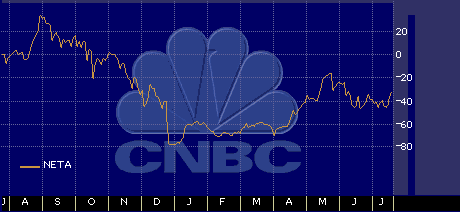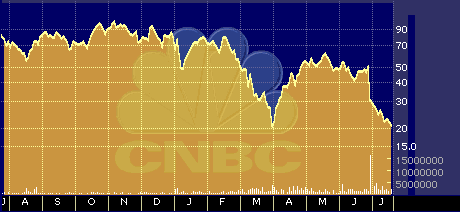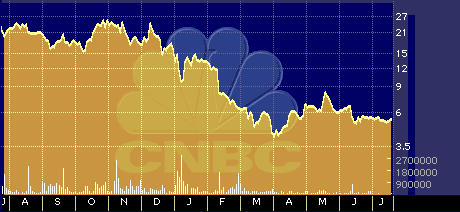
Crime Pays for Online-Security Firms
Crime Pays for Online-Security Firms
By Hal Plotkin
Silicon Valley Correspondent
Everyone knows the already-sizable online security market is going to grow larger. The big question up until now, though, has been whether the future of that market will belong to companies offering soup-to-nuts online-security solutions or whether you would be better off buying the stocks of companies that have best-of-breed products that address smaller, individual online-security niches.
The jury looks like it is coming in on that one.

Network Associates Inc. and Axent Technologies Inc.
52-Week Comparison Chart
Conspicuous disappointments at several of the leading would-be soup-to-nuts online security players, such as Axent Technologies Inc. {AXNT} and Network Associates Inc. {NETA}, have convinced many seasoned observers that, for the foreseeable future at least, so-called best-of-breed online-security firms such as Internet Security Systems and Rainbow Technologies are likely to be much-smarter bets.
The traditional argument against the so-called best-of-breed players has been that they can’t offer corporate customers a full range of comprehensive, cutting-edge data-protection services. On the surface, that would appear to leave them with a weaker hand.
But it turns out the firms that have been promising to do it all haven’t yet shown they can get the job done. The evidence is mounting, analysts say, that no one company can possibly keep up with all the different security challenges posed by the incredibly creative and industrious global ranks of online thieves and would-be saboteurs.
“The companies that have tried to do it all have failed miserably,” says Sean Jackson, an analyst who covers online-security stocks for SunTrust Equitable Securities, based in Nashville, Tenn.
Like others, Jackson cites Axent Technologies and Network Associates as cases in point. Axent Technologies recently threw in the towel as an independent player and is in the process of being acquired by Symantec Corp. {SYMC}. Likewise, Network Associates recently divided its once-highly touted comprehensive online-security operation into five separate business units that are now focused on individual market niches, in the hopes that those divisions will perform better than they did as a whole.
“Online security is only as good as the weakest link in the chain,” Jackson says. “No one vendor has been able to consolidate all the different functions.”
That is probably because there is just too much to worry about. Online-security needs run the gamut from intrusion detection to virus protection to authenticating users, for starters. Each of those technologies, in turn, relies on other technologies, such as state-of-the-art encryption, which scrambles online transmissions; digital firewalls, which distinguish between welcome and unwelcome users; and up-to-date virus countermeasures. Staying current in all those different areas usually requires vastly different technical skill sets that often can’t be found in any one company.
That is why the fragmented market once looked like an almost-certain consolidation play. That is, until the more-recent round of overreaching, merger-induced indigestion set in
It is possible that some of the smaller players will continue to be consolidated into larger operations through mergers and acquisitions, even though the first of those deals haven’t been notable successes. Combine that with growing evidence that customers prefer best-of-breed products, and you get a sense of why the most-successful niche players are becoming more and more valuable.
Right now, analysts particularly like online-security niche players Internet Security Systems and Rainbow Technologies.
Internet Security Systems Inc. {ISSX}
Atlanta-based Internet Security Systems sells online intrusion-detection systems. The firm’s technology not only prevents unauthorized online access, it also makes a record of the source of break-in attempts to facilitate the identification of the trespassers.
The company has created marketing partnerships with BellSouth Corp. {BLS}, Check Point Software Technologies Ltd. {CHKP}, Compaq Computer Corp. {CPQ}, Lucent Technologies Inc. {LU}, Microsoft Corp. {MSFT}, Nortel Networks Corp. {NT}, and Trend Micro Inc. {TMIC}, among others.
On Tuesday, the firm posted third-quarter earnings of 11 cents a share, as compared with 2 cents the previous quarter. It was the company’s 21st-consecutive quarter showing growth, with sales swelling to $51.7 million, representing a 73% jump over the same quarter a year earlier.
The kudos are rolling in.
“ISS is a phenomenal company,” says Andrew Ari Clibanoff, an analyst with Jupiter Communications in New York. “The numbers speak for themselves.”
“ISS is one of the best-of-breed players,” agrees Chris Christiansen, an analyst with International Data Corp. in Framingham, Massachusetts. “They’re a major player in intrusion detection and certainly worth looking at.”
Jackson has a “strong buy” rating on the stock, along with a $117 12-month price target. “It has a pretty dominant position in its market,” he says.

Internet Security Systems Inc. 52-Week Stock-Performance Chart
David Breiner, an analyst at Prudential Securities in Palo Alto, Calif., also likes the stock, giving it an “accumulate” rating, his firm’s second-highest recommendation. But he also warns that investors probably shouldn’t expect too much too soon, given how the stock has performed recently.
“It’s not an inexpensive stock,” Breiner says. “Investors have recognized their excellence in their category and have rewarded the company.”
Nevertheless, Breiner still says he would be a buyer at current prices. “It’s not a short-term play,” he says. “But even in the 12-month time frame, we think investors who buy the stock will be rewarded.”
Rainbow Technologies Inc. {RNBO}
Irvine, Calif.-based Rainbow Technologies specializes in a handful of critical online-security niches where it has carved out a large presence. The firm’s markets include software and hardware that speeds up the processing of encrypted data and systems that protect software makers that sell server-based software from unauthorized use of their products.
Rainbow’s encryption-acceleration products are proving particularly popular with third-party resellers and system integrators that serve financial, banking and high-traffic e-commerce sites. Encryption is a process that scrambles data on one end and unscrambles it on the other, so communications can’t be read or altered while in transit. The problem is that encrypted transmissions can take up to 100 times as long to process, which often slows down overall performance at the most-heavily trafficked secure Web sites. Rainbow’s product reduces the bottleneck by greatly speeding up performance.
“Rainbow is an intriguing company,” Christiansen says. “In a lot of other areas, you’re talking about many vendors. But there are only one or two other competitors in their part of the market, and you don’t hear much about them.”
The company is scheduled to announce third-quarter earnings on Oct. 25, with analysts expecting 29 cents a share, according to First Call Corp.’s consensus estimate.
Rainbow posted second-quarter net income of 36 cents a share, compared with 15 cents a year earlier. The company recognized an unrealized gain on an investment and wrote off assets related to another investment during the second quarter, which together resulted in a net positive earnings impact of 9 cents a share, accounting for what otherwise would appear to be a downturn in earnings.
Revenue for the second quarter grew 32% to $38.9 million, compared with $29.4 for the same quarter last year.
Jim Ricchiuti, an analyst at Needham & Co. in New York, has a $55 12-month price target on the stock, which he rates “strong buy.”

Rainbow 52-Week Stock-Performance Chart
“Their big customers are the [original equipment manufacturers], like Intel {INTC}, Sun Microsystems {SUNW}, Hewlett-Packard {HWP}, and Nortel,” he says. “The competition is pretty limited right now, and they have some very good products. Gross margins for their crypto products are somewhere in the 70% range.”
Jackson also puts his 12-month price target for Rainbow’s stock at $55, saying it is one of his top picks in the sector. “It’s a small-cap company,” he says. “But they’re extremely well-positioned.”


